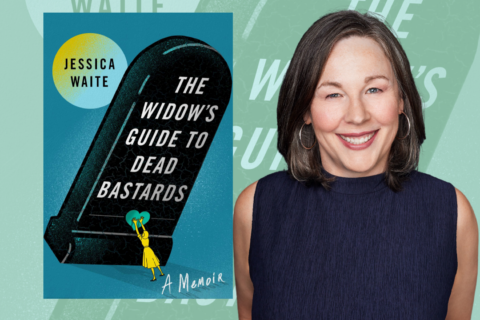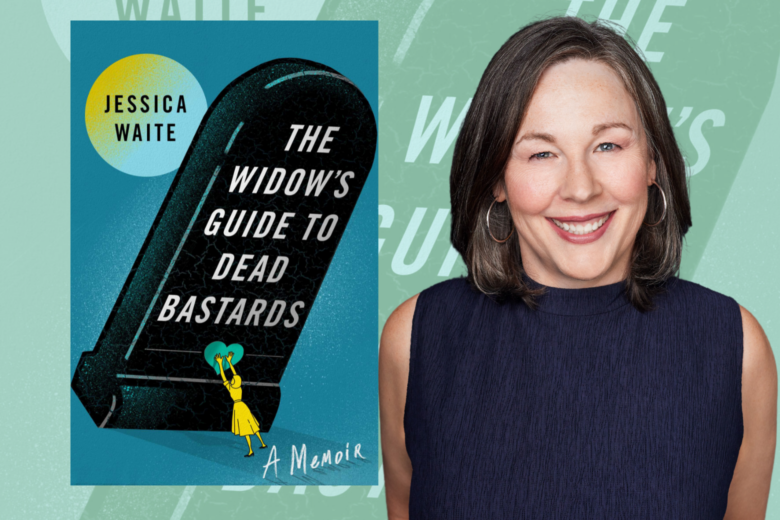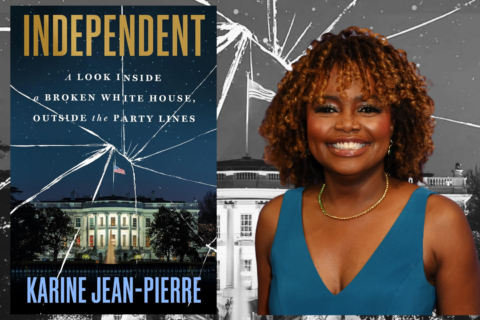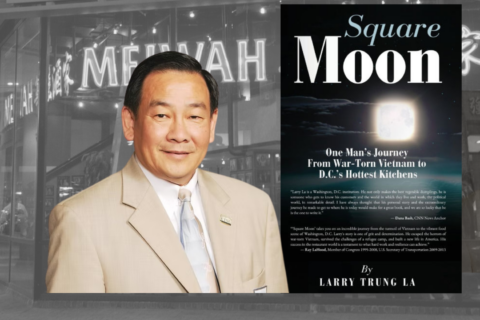This story is part of the WTOP Book Report series written by Terik King. Read more of that coverage.

Losing a spouse can be one of life’s most profound sorrows. Yet, discovering in the aftermath that they harbored secrets you could never have fathomed adds an entirely new layer of grief and confusion. It can often leave you grappling with how to move forward.
This is the story Jessica Waite tells in her new memoir, The Widow’s Guide to Dead Bastards (Atria Books). The book offers a raw, unflinching and, at times, darkly humorous account of her life after the sudden death of her husband, Sean, whose passing while away on an international business trip revealed a series of shocking secrets that shattered her perception of their marriage.
In the tumultuous aftermath of her husband’s death, Waite uncovered a hidden life of compulsive spending, infidelity, drug use and a long-standing addiction to pornography which manifested itself in what she dubbed “the Matrix of Porn”— a meticulously-organized and extensive collection of explicit material that revealed the depth of her husband’s struggles.
“I looked at the timestamps, and I started to see patterns of behavior of when he wasn’t well,” Waite recalled in an interview with the WTOP Book Report. “And it made me understand that there was some other kind of, like, an addictive quality driving him. He was a very reasonably adjusted person in a lot of ways, but there was this thing that he couldn’t control.”
Waite’s reaction and response, as depicted in Widow’s Guide to Dead Bastards, reads much like the seven stages of grief — with an extra dash of the “anger” phase.
“I could not will myself to forgive … I tried so many times. And there were a few people that needed forgiving in this story,” said Waite. Not the least among them, she said, was herself. “I don’t behave the best … some of my worst moments come through in this story,” she confessed.
In the memoir, Waite also recounts a series of inexplicable events that occurred after Sean’s death, which she interprets as possible attempts by her husband to communicate from beyond the grave. From TVs turning on by themselves to mysterious coins appearing in her home, these incidents added a surreal dimension to her grieving process.
“Those things didn’t used to happen,” said Waite, “And part of me was like ‘Is it Sean?’ But if it is, I’m still mad at him, so I don’t want to connect back in that way! (or) am I going mad?”
While Waite acknowledges the skepticism surrounding such experiences, she emphasized that they helped move her along toward a sense of connection and closure. “That’s what I’m really pursuing (through) the latter half of the story,” she said.
Waite said an exploration of these discoveries led her to a deeper understanding of her husband’s battles with mental health, particularly the obsessive-compulsive tendencies he had already exhibited at different points during their intermittently turbulent marriage.
“What I think happens is when we come into real compassion, forgiveness just floods us … it’s just something that emerges when we can stand in another person’s shoes and feel compassion,” Waite reflected.
Despite the heavy themes of grief and betrayal, Waite’s memoir is not without humor. She credits her family’s penchant for gallows humor with helping her navigate the darkest moments. “At some point, things become so absurd that all you can do is laugh,” she said, quoting the late Carrie Fisher: “If my life wasn’t funny, then it would just be true, and that’s unacceptable.”
Waite described her unforgettable choice of title as both provocative and deeply meaningful. “The title was actually a joke suggestion by one of Sean’s best friends,” she explained.
Initially, it was a placeholder on her whiteboard, but after reflecting on the earnest-yet-forgettable working alternate title, Waite decided to keep the original suggestion. “I asked my (book) agent: ‘what do you think of this?’ And she’s like, ‘Gold!'” she recalled, noting that even her son signed off on the choice.
Waite ultimately emphasized that The Widow’s Guide to Dead Bastards is by no means a self-help “guide book” per se, but rather a deeply personal account of one woman’s experience. She hopes readers take away a sense of connection and the importance of paying attention to both the beauty and the pain in life.
When asked what motivated her to share such a personal story, Waite explained that she initially wrote for her own healing. However, as the manuscript took shape, she realized the universal nature of her experiences.
“Show me someone who has never grieved or been betrayed,” she said, noting that she hopes her book can offer solace to others going through similar struggles. “Even in our worst moments,” said Waite, “there’s beautiful things all around us.”
Get breaking news and daily headlines delivered to your email inbox by signing up here.
© 2024 WTOP. All Rights Reserved. This website is not intended for users located within the European Economic Area.









